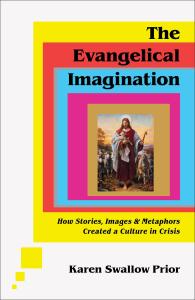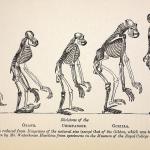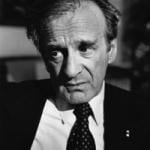One of the privileges of writing for the Anxious Bench is that when I read a book I appreciate, I sometimes get to interview the author! So I am thrilled to share this conversation with Karen Swallow Prior about The Evangelical Imagination: How Stories, Images, and Metaphors Created a Culture in Crisis (Brazos, 2023).

Karen Swallow Prior, Ph. D., is a reader, writer, and professor. In addition to writing The Evangelical Imagination, she is the author of On Reading Well: Finding the Good Life through Great Books (Brazos 2018); Fierce Convictions: The Extraordinary Life of Hannah More—Poet, Reformer, Abolitionist (Thomas Nelson, 2014); and Booked: Literature in the Soul of Me (T. S. Poetry Press, 2012). She is co-editor of Cultural Engagement: A Crash Course in Contemporary Issues (Zondervan 2019) and has contributed to numerous other books. She has a monthly column for Religion News Service. Her writing has appeared at Christianity Today, The New York Times, The Atlantic, The Washington Post, First Things, Vox, Think Christian, The Gospel Coalition, and various other places. She hosted the podcast Jane and Jesus. She is a Contributing Editor for Comment, a founding member of The Pelican Project, a Senior Fellow at the Trinity Forum, and a Senior Fellow at the L. Russ Bush Center for Faith and Culture. She and her husband live on a 100-year-old homestead in central Virginia with dogs, chickens, and lots of books. You can receive Karen’s free weekly newsletter, The Priory, by signing up here.
Our conversation has been lightly edited for length and clarity.
Andrea Turpin: I really enjoyed The Evangelical Imagination! How did you get the idea for this book? What motivated you to write it?
Karen Swallow Prior: Thank you! The book is just different enough (I think) that I really worried in the process of writing it that no one would “get” it. But the response has been pretty enthusiastic so far. It’s a great relief!
Broadly, the idea came from many conversations that I’ve had around the evangelical movement and its relationship to its cultural context both now and throughout its history. But more specifically, it was having those discussions in the classroom with evangelical students over the years who were, right before my eyes, undergoing a process of separating out what is truly of our faith and what is merely cultural. Seeing my students’ need to do that, and many times their struggle to do so, added to my own desire to help them do this, is what motivated this book.
 AT: What is the central argument of your book?
AT: What is the central argument of your book?
KSP: The basic argument is that the evangelical movement both influenced and has been influenced by the surrounding culture (the most prominent era being the Victorian age). I draw primarily on Charles Taylor’s concept of social imaginaries to show this reciprocal relationship. In its beginnings the evangelical movement emphasized some key Christian principles (such as those qualities famously identified by David Bebbington: conversionism, crucicentrism, biblicism, and activism) that have become deformed or distorted through the influence of the surrounding culture. I try to show that we must—as Christians always must in any era or cultural context—step back and examine where elements of the faith have become too closely entangled with cultural beliefs and practices that distort the understanding and practice of our faith.
AT: How would you respond to the argument that negative traits like racism or sexism were baked into evangelicalism from the beginning and can’t be separated out as cultural influences that distort “real” evangelicalism?
Because evangelicalism arose in a cultural context that was racist and sexist, I can’t disagree that it was at least mixed in. If it was “baked” in, it can’t be removed. That really is the question. (See how important metaphors are?) I acknowledge that. Yet, even from the beginning there were those who were ahead of their times in terms of race and gender. It is they who gave me hope and inspiration. However, I do admit that that hope has diminished over time.
AT: Speaking of metaphors, your book contends that American evangelicals make use of multiple metaphors to understand their faith and their life: awakening, conversion, testimony, improvement, sentimentality, materiality, domesticity, empire, reformation, and rapture. You spend a chapter on each one.
As you note, each arose from a past cultural context and has morphed over time, but is there one that you found most fruitful to explore in understanding the contemporary church? Do you think different ones were dominant in the evangelical past vs. present, or has there been substantial continuity?
KSP: I chose the metaphors and images I thought reflect more substantial continuity simply because I was trying to model in my book how we might engage in similar examinations of so many more of lesser (or greater) lasting influence in our social imaginaries.
Because conversionism is one of the most defining characteristics of evangelicalism and has been since its beginnings, I’d say that particular idea might be the one most fruitful to examine because it is one that is so biblical, yet has been so distorted in so many ways. This metaphor is fruitful to consider in and of itself, but also shows what we must do for all our most essential (as well as peripheral) values and ideals.
As an evangelical, I believe conversion–which goes by various names in the Bible, including being born again, repenting, believing, being saved, becoming a new creature–is necessary to salvation. I think the evangelical movement has been right to emphasize conversion and even the experience of conversion. However, any good, true thing can become distorted. If conversion is emphasized at the expense of discipleship, if the measurable event (such as profession of faith) is prioritized over the immeasurable one (such as spiritual growth) then individual souls and the church body as a whole suffer.
Now, of course, it’s not either/or but both/and. But modern evangelicalism is, I believe, bearing the bad fruit of cheap grace and faulty discipleship. We are in such a polarized and paranoid age that, unfortunately, to consider the distortion of something good, or its excess (in virtue ethics the excess of a good is a vice), is too easily viewed as saying something good is bad. That’s not it at all. It is merely to distinguish between right use and abuse.
AT: That’s a helpful and wide-ranging answer. Related, what genre would you say this book is? History? Literary studies? Contemporary cultural analysis?
KSP: I’d call it cultural criticism but within the context of church history. Of course, I draw heavily on my area of expertise in literary studies.
AT: That expertise is one of the unique things you bring to the table. I am a U.S. historian who writes about American Christianity, including American evangelicalism. Your PhD is in British literature. How does this perspective affect how you write about American evangelicalism?
KSP: That’s a great question. I am not a trained historian of any kind. (I’m sure it shows!) And the study I have done of history is primarily through my study of eighteenth- and nineteenth-century British literature. I’m very nervous about doing any kind of historical work (and hope my caveats in the book’s preface covered that concern).
But it was through researching and writing my dissertation (on the British evangelical writer, reformer, and abolitionist Hannah More) that I learned the history of evangelicalism in the transatlantic region of the modern age. I would say that my understanding of evangelicalism is biased toward its British origins. My understanding of what was happening in America at that time is almost as an outsider because (although I am thoroughly American) I have been immersed in British history and literature for decades.
An interesting, related note is that it is very much because of what I learned about the British evangelical movement of the eighteenth and nineteenth centuries that I first identified (and continue to identify) as an evangelical. The movement was by no means perfect, but it was much more robust, theological, and of a reforming spirit than the one caricatured in headlines and election polls in the U.S. today.
AT: Given that you approach the topic from a fresh angle, are there other works on U.S. evangelicalism that you see yourself conversing with?
KSP: There have been so many interesting works written of late. Certainly, Jesus and John Wayne by Kristin Kobes Du Mez was an interesting and insightful read in terms of one central element of the American evangelical social imaginary. But I had to dig back further in researching this book and found some seminal studies of the modern American evangelical scene very helpful: The Evangelicals by Frances Fitzgerald, Homespun Gospel by Todd M. Brenneman, The Book of Jerry Falwell by Susan Friend Harding, Evangelicals, Incorporated by Daniel Vaca, and Reading Evangelicals by Daniel Silliman are just a few of the sources I cite in my book. I also drew on the considerable research and analysis I did to write the chapter I contributed to a new handbook on a related topic published this year, Baptist Political Theology, edited by Thomas S. Kidd, Paul D. Miller, and Andrew T. Walker.
AT: Good list. Final question: what do you most hope readers take away from your book?
KSP: As I suggest above, I hope readers are better able to participate in the necessary, ongoing process of distinguishing the principles of the Christian faith that are eternal and unchanging from the cultural stories, metaphors, and images that embody these principles in varying degrees of fidelity. Don’t misunderstand me: this entanglement with cultural narratives and ideas isn’t unique to evangelicals, nor is being creatures of culture necessarily a bad thing. In fact, living within the cultures of this world is God’s plan. It is part of being human. I think, however, that because evangelicalism from its beginnings in the western world has been so tied to political power, it has been easier for us to overlook the entanglement that is inherent to being part of any human culture. Yet, our task is no different from Christians within any Christian movement, sect, time, place, or culture.
AT: Thank you!













